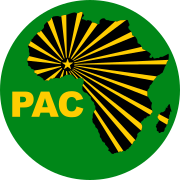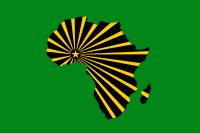Pan Africanist Congress of Azania
Pan Africanist Congress of Azania | |
|---|---|
 | |
| Abbreviation | PAC |
| President | Mzwanele Nyhontso |
| Secretary-General | Apa Pooe |
| Founder | Robert Mangaliso Sobukwe |
| Founded | 6 April 1959 |
| Split from | African National Congress |
| Headquarters | 2nd Floor, The Main Change Bld, 20 Kruger Street, Johannesburg, Gauteng[1] |
| Student wing | Pan Africanist Student Organization |
| Youth wing | Pan Africanist Youth Congress of Azania |
| Women's wing | Pan Africanist Women's Organisation |
| Paramilitary wing | Azanian People's Liberation Army (formerly) |
| Ideology | Black Nationalism Pan-Africanism African Socialism |
| Political position | Left-wing to far-left |
| Slogan | Izwe Lethu!! Our Land!! |
| National Assembly | 1 / 400 |
| National Council of Provinces | 0 / 90 |
| Pan-African Parliament | 0 / 5 |
| Party flag | |
 | |
| Website | |
| www.pacofazania.org.za | |
The Pan Africanist Congress of Azania (formerly known as the Pan Africanist Congress, abbreviated as the PAC) is a South African Pan-Africanist movement that is now a political party. It was founded by an Africanist group, led by Robert Sobukwe, that broke away from the African National Congress (ANC).[2][3]
History
The PAC was formally launched on 6 April 1959 at Orlando Communal Hall in Soweto. A number of African National Congress (ANC) members broke away because they objected to the substitution of the 1949 Programme of Action with the Freedom Charter adopted in 1955, which used multiracialist and nonracialist language as opposed to Black Africanist affirmations. The PAC at the time considered South Africa to be a black state by right and refused to support equal rights for other nationalities, such as Indian and White South Africans. They feared that the inclusion of ethnic minorities in the Anti-Apartheid Movement would lead to a take over by whites and "communist Indians" and dilute the struggle against apartheid to the "communist" methods of the ANC. Further they objected to the inclusion of other national groups such as the Communist Party of South Africa in the anti-apartheid struggle. Robert Sobukwe was elected as the first president, and Potlako Leballo as the Secretary General.[4][5][6][7]
On 21 March 1960, the PAC organised a campaign against pass laws. People gathered in the townships of Sharpeville and Langa where Sobukwe and other top leaders were arrested and later convicted for incitement. Sobukwe was sentenced to three years and Potlako Leballo to two years in prison. Sobukwe died in Kimberley, Cape Province, 1978 of lung cancer. Immediately after the Sharpeville massacre the National Party Government banned both the ANC and PAC on 8 April 1960. The PAC responded by founding its armed wing, the Azanian People's Liberation Army.
Ideology
The PAC followed the idea that the South African Government should be constituted by the African people owing their allegiance only to Africa, as stated by Sobukwe in the inaugural speech of the PAC:
"We aim, politically, at government of the Africans by the Africans, for the Africans, with everybody who owes his only loyalty to Africa and who is prepared to accept the democratic rule of an African majority being regarded as an African."[8]
It is Pan Africanism with three principles of African nationalism, socialism, and continental unity. Its body of ideas drew largely from the teachings of Anton Lembede, George Padmore, Marcus Garvey, Martin Delany, Kwame Nkrumah, and W. E. B. Du Bois. It further seeks to rename South Africa to Azania.[2]
The PAC historically rejected Marxism, opposed communism (though it itself had borrowed from some Maoist tenents) and the inclusion of ethnic minorities within the liberation struggle, instead advocating black liberation exclusively within a Black nationalist concept.[4][5][6][7]
Leadership struggles
The PAC has been beset by infighting and has had numerous changes of leadership since its transition to a political party. In 1996, Clarence Makwetu, who led the party in the 1994 elections, was removed on the basis of "bringing the party into disrepute'.[9]
In August 2013, the PAC elected Alton Mphethi as president, after previous leader Letlapa Mphahlele was expelled in May amidst allegations of attempting to cause division in the party, financial impropriety and poor quality leadership.[10][11]
A faction of the PAC continued to regard Mphahlele as leader. The matter was resolved in the courts, with Mpheti eventually being confirmed as party leader for the 2014 election.[12][13]
Mpheti has since been charged with murder for the death of a Swazi national, Mthunzi Mavundla.[14]
Luthando Mbinda was elected president at the 2014 congress in Botshabelo, while Letlapa Mphahlele was elected in July 2015 in Manguang. Mbinda claimed that Mphahlele's election was not valid, as he was not a valid member, while Mphahlele is challenging his expulsion in court.
The Independent Electoral Commission suspended the party's statutory fund’s allocations until there was clarity about who leads the party, and in October 2015 the high court confirmed that Mbinda was the recognised leader.[15][16]
Conflict then arose between Mbinda and Chief Executive Officer Narius Moloto. Mbinda was subsequently charged by the PAC and later expelled for bringing the organisation into disrepute. The current president, Narius Moloto was elected party leader in December 2017.[17][18].
Infighting continued after the 2019 elections, with leader Narius Moloto unilaterally dissolving the party's structures, a decision which was later set aside by the courts.[19]
In August 2019, in Limpopo, one faction elected Moloto as leader, while a week later in Bloemfontein, another faction elected Mzwanele Nyhontso as leader. In October 2019, the Independent Electoral Commission recognised Nyhontso as the legitimate party leader.[20]
Election results
National elections
| Election | Total votes | Share of vote | Seats | +/– | Government |
|---|---|---|---|---|---|
| 1994 | 243,478 | 1.25% | 5 / 400
|
– | in opposition |
| 1999 | 113,125 | 0.78% | 3 / 400
|
in opposition | |
| 2004 | 113,512 | 0.73% | 3 / 400
|
in opposition | |
| 2009 | 48,530 | 0.27% | 1 / 400
|
in opposition | |
| 2014 | 37,784 | 0.21% | 1 / 400
|
in opposition | |
| 2019 | 32,677 | 0.19% | 1 / 400
|
in opposition |
Provincial elections
| Election[21] | Eastern Cape | Free State | Gauteng | Kwazulu-Natal | Limpopo | Mpumalanga | North-West | Northern Cape | Western Cape | |||||||||
|---|---|---|---|---|---|---|---|---|---|---|---|---|---|---|---|---|---|---|
| % | Seats | % | Seats | % | Seats | % | Seats | % | Seats | % | Seats | % | Seats | % | Seats | % | Seats | |
| 1994 | 2.04% | 1/56 | 1.81% | 0/30 | 1.47% | 1/86 | 0.73% | 1/81 | 1.27% | 1/40 | 1.63% | 0/30 | 1.73% | 0/30 | 0.93% | 0/30 | 1.06% | 0/42 |
| 1999 | 1.14% | 1/63 | 1.15% | 0/30 | 0.73% | 0/73 | 0.26% | 0/80 | 1.41% | 1/49 | 0.66% | 0/30 | 0.74% | 0/33 | 0.66% | 0/30 | 0.49% | 0/42 |
| 2004 | 1.00% | 1/63 | 1.18% | 0/30 | 0.85% | 1/73 | 0.19% | 0/80 | 0.94% | 0/49 | 0.69% | 0/30 | 0.84% | 0/33 | 0.43% | 0/30 | 0.42% | 0/42 |
| 2009 | 0.54% | 0/63 | 0.33% | 0/30 | 0.31% | 0/73 | 0.07% | 0/80 | 0.53% | 0/49 | 0.32% | 0/30 | 0.26% | 0/33 | 0.22% | 0/30 | 0.23% | 0/42 |
| 2014 | 0.44% | 0/63 | 0.21% | 0/30 | 0.26% | 0/73 | 0.08% | 0/80 | 0.29% | 0/49 | 0.23% | 0/30 | 0.14% | 0/33 | 0.11% | 0/30 | 0.17% | 0/42 |
| 2019 | 0.41% | 0/63 | 0.17% | 0/30 | 0.24% | 0/73 | 0.07% | 0/80 | 0.17% | 0/49 | 0.14% | 0/30 | 0.11% | 0/33 | 0.11% | 0/30 | 0.19% | 0/42 |
Municipal elections
| Election | Votes | % |
|---|---|---|
| 1995-96 | 104,455 | 1.2% |
| 2000 | 1.2% | |
| 2006 | 306,747 | 1.2% |
| 2011 | 118,822 | 0.4% |
| 2016[22] | 74,607 | 0.19% |
See also
- Azanian National Youth Unity
- Azanian People's Liberation Army
- Freedom Charter
- History of South Africa
References
- ^ Pan Africanist Congress of Azania. "Contacts". www.pacofazania.org.za.org.za. Archived from the original on 19 October 2013. Retrieved 14 September 2013.
- ^ a b "Pan-Africanist Congress of Azania (PAC) (South African organization)". Encyclopædia Britannica. 2014-05-12. Retrieved 2014-07-06.
- ^ Why the PAC wants South Africa renamed Azania
- ^ a b "Pan-Africanist Congress of Azania | South African organization". Encyclopedia Britannica. Retrieved 2020-06-15.
- ^ a b "Pan Africanist Congress Of Azania (PAC) - The O'Malley Archives". omalley.nelsonmandela.org. Retrieved 2020-06-15.
- ^ a b "Pan Africanist Congress (PAC) | South African History Online". www.sahistory.org.za. Retrieved 2020-06-15.
- ^ a b "South Africa - Political Parties". countrystudies.us. Retrieved 2020-06-15.
- ^ "Robert Sobukwe Inaugural Speech, April 1959". South African History Online - Towards a People's History. Retrieved 2014-07-06.
- ^ "SA has moved backwards, says PAC stalwart Makwetu". Mail and Guardian. Retrieved 3 April 2016.
- ^ Ntokozo Sindane (2013-08-11). "PAC Announces New Party President". The Public News Hub. Retrieved 2014-07-06.
- ^ "PAC to plot a new path". The Citizen. 2013-06-09. Retrieved 2014-07-06.
- ^ "PAC hits campaign trail after leadership fight ends". Herald Live. Archived from the original on 2 April 2015. Retrieved 20 March 2015.
- ^ "Pan-Africanist Congress of Azania (PAC)". Encyclopædia Britannica. Archived from the original on 2 April 2015. Retrieved 20 March 2015.
- ^ "I lied about murder to protect my wife's dignity – Alton Mphethi". City Press. Archived from the original on 20 March 2015. Retrieved 20 March 2015.
- ^ Marianne Merten (10 July 2015). "PAC court bid to get its IEC funding". Independent Online. Retrieved 10 July 2015.
- ^ "High Court Ruling". pac.org.za. Archived from the original on 31 March 2016. Retrieved 3 April 2016.
- ^ Naki, Eric (28 April 2017). "Mbinda, Moloto war threatening to tear PAC apart". citizen.co.za.
- ^ Motau, Koketšo. "PAC elects Narius Moloto as new party president". ewn.co.za.
- ^ Ntshidi, Edwin. "PAC leader Narius Moloto dismisses suspension reports". ewn.co.za. Retrieved 2019-07-23.
- ^ "PAC re-elects Mzwanele Nyhontso as president". SABC News. 2019-09-01. Retrieved 2019-10-30.
- ^ "Results Dashboard". www.elections.org.za. Retrieved 2019-05-11.
- ^ "Results Summary - All Ballots" (PDF). elections.org.za. Retrieved 11 August 2016.
External links
- Website of the Pan Africanist Congress
- Alternative Website of the Pan Africanist Congress
- Pan Africanist Congress Publications Collection 1958-1995
- Archival Information can be found at the Borthwick Institute for Archives, University of York: Congress of South Africa

